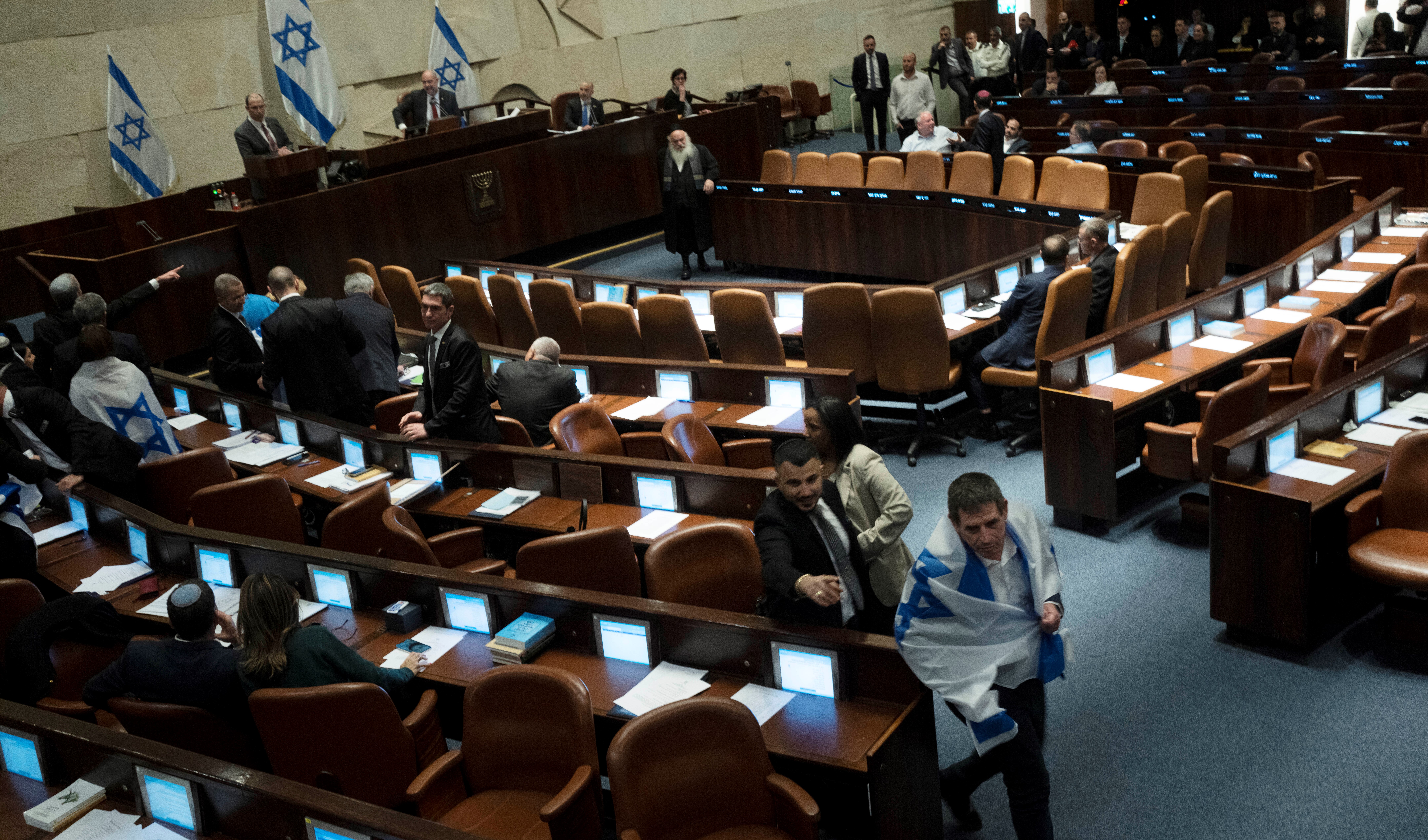'Judicial reform' underway as Knesset approves fortification law
The Israeli Knesset approves the first reading of the "override clause" while Israeli media talks of a deep legislative crisis in "Israel".
-

An Israeli lawmaker is pursued by security as he drapes himself in the national flag in protest, in the Knesset, against a contentious plan to overhaul the country's legal system, in Al-Quds, Monday, Feb. 20, 2023 (AP).
A crucial component of the legislation for judicial reform, the "override clause", was passed by the Knesset in its first reading, with 61 votes for and 52 against. The passed component now limits the High Court's ability to invalidate laws and overturn decisions reached by a majority of 61 Knesset members.
The draft amendments to the "Basic Law: The Government", which was approved in a first reading, stipulate the fortification of the position of the Prime Minister.
According to Maariv, amendment number 15 of the Basic Law, which discusses the "Disqualification of the Prime Minister," proposed to state that "the disqualification of the Prime Minister from performing his duties can only occur due to physical or mental incapacity of the Prime Minister. In addition, the authority to declare impeachment of the Prime Minister from performing his duties and the termination of impeachment shall be solely based on a notification to the Knesset by the Prime Minister or a notification by the government received by a majority of three-quarters of its members."
It also stresses the conditions that allow the Supreme Court to invalidate a Basic Law and allows the Knesset to protect a law from any annulment by means of a legislative process that requires a simple majority (61 deputies out of 120), in the so-called "override clause" that limits the capabilities of the Supreme Court.
In the event that the Prime Minister informs the Speaker of the Knesset that he opposes the Government's announcement, the latter must schedule a "special meeting" wherein "the Prime Minister's resolution will not enter into force unless approved by a majority of 90 members of the Knesset."
In general, the draft judicial amendments, in their current form, will greatly limit the powers of the Supreme Court and give the political majority coalition the power to appoint judges.
The Israeli occupation's government says the reforms are necessary to restore the balance of power between the people's representatives and the Supreme Court, which Prime Minister Benjamin Netanyahu accuses of being politicized.
It is worth noting that last Thursday, Israeli President Isaac Herzog called for putting an end to the current legislative process.
Deep legislative crisis in "Israel"
According to Israeli media, if the process of enacting judicial amendments continues without dialogue, without reaching a settlement, and without broad consensus on the principles of Herzog's proposal, "at the end of the month we will reach legislation with the second and third readings."
And then "we will lose all control," and it can be assumed, in advance, that the Supreme Court will likely reject the judiciary reform, noting that from that moment on, "Israel" will be in a deep legislative crisis from which there would be no way out.
Furthermore, Israeli media pointed out that "Israel" would face the "destruction of the Third Temple" if it does not put an end to the initiative of judicial amendments in the coming weeks and reach a settlement.
Since the introduction of the draft law at the beginning of January, by the government that Netanyahu formed at the end of last December, widespread protests have emerged across the occupation.
Read more: Civil disobedience call if 'Israel' passes judicial changes: Former PM

 3 Min Read
3 Min Read








